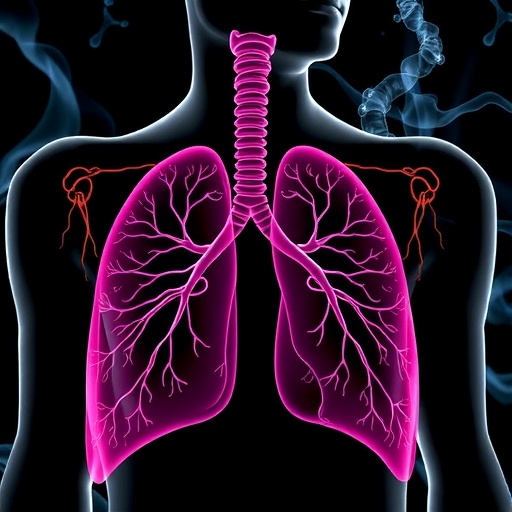In a groundbreaking study published in BMC Complementary Medicine and Therapies, a novel intervention for stable bronchiectasis, Qingbu Weijing decoction, is set to undergo rigorous clinical testing. Bronchiectasis, a chronic pulmonary condition characterized by an abnormal and permanent dilation of the bronchi, can lead to severe respiratory complications. The quest for effective treatments has been ongoing, and this protocol aims to investigate the efficacy and safety of Qingbu Weijing decoction, a traditional Chinese medicine formulation.
The study proposes a multicenter, double-blind, randomized, and placebo-controlled trial, which is a robust design frequently employed in clinical research to mitigate bias. This method not only enhances the credibility of the results but also ensures that they can be generalized across various populations. This trial will engage multiple centers, allowing for a comprehensive analysis of the decoction’s effect across diverse patient demographics.
Qingbu Weijing decoction, steeped in the principles of traditional Chinese medicine, comprises various herbs known for their anti-inflammatory and bronchodilatory properties. Given the escalating burden of chronic respiratory diseases, integrating such alternative therapies could offer new avenues for treatment. Researchers hypothesize that this decoction may reduce exacerbations and improve quality of life for patients with stable bronchiectasis.
The strategic design of the trial outlines specific inclusion and exclusion criteria for participants. Patients eligible for the study will include adults diagnosed with stable bronchiectasis who experience recurrent pulmonary infections and significant respiratory symptoms. However, individuals with severe pulmonary co-morbidities, recent respiratory infections, or those on certain medications will be excluded to ensure a homogenous study population.
One primary outcome the researchers will evaluate is the change in the frequency of acute exacerbations over the study period. Exacerbations can lead to hospitalizations, further lung function decline, and overall deteriorated health status. Secondary outcomes will include measurements of respiratory function, quality of life assessments, and adverse events monitoring. By collecting both qualitative and quantitative data, the study aims to present a comprehensive evaluation of the decoction’s impact.
Another significant aspect of this research is the place of traditional medicine in contemporary western healthcare. The acceptance and application of alternative therapies, such as those derived from traditional Chinese medicine, remain a topic of heated debate. The results of this trial could contribute valuable insights into how these ancient practices might synergize with modern medical approaches, offering enhanced treatment modalities for chronic conditions.
The investigators plan to enroll a substantial sample size to fortify the statistical power of the findings. Typically, such trials require hundreds of participants to achieve reliable results. The statistical analysis will involve advanced modeling techniques to ascertain the decoction’s effects while accounting for possible confounding factors. Transparency in reporting will be critical, as is ethics approval, which has been secured to protect patient rights and ensure informed consent.
Participants will be closely monitored throughout the study. Regular follow-up visits will provide the research team with vital data on a variety of health metrics. This real-time data collection methodology will ensure that any adverse effects of the decoction can be rapidly assessed and managed. Safety is a paramount concern, and the researchers will track not just the participants’ responses to the decoction but also the overall tolerability of the treatment.
Furthermore, this trial may pave the way for larger studies that could lead to broader acceptance of Qingbu Weijing decoction in the clinical management of bronchiectasis. The potential for this herbal remedy to reduce reliance on conventional pharmaceuticals could resonate well with patients seeking natural alternatives to standard care. Amidst concerns regarding antibiotic overuse and the rise of drug-resistant infections, alternative approaches are increasingly being sought after.
The integration of traditional Chinese medicine with contemporary clinical practices reflects a growing trend toward holistic care. Integrative medicine, which combines both conventional and alternative therapies, seeks to address the whole patient rather than merely treating symptoms. As the medical community increasingly embraces this philosophy, trials like this one will likely play an essential role in evaluating the utility of alternative treatments.
Pending the outcome of this trial, the implications may extend beyond bronchiectasis. Should Qingbu Weijing decoction demonstrate significant benefits, there could be considerable interest in exploring similar herbal formulations for a range of respiratory ailments. With respiratory diseases being a major public health concern globally, every potential new treatment avenue is critical.
In conclusion, the study protocol for evaluating the efficacy and safety of Qingbu Weijing decoction in stable bronchiectasis patients outlines a crucial step forward in respiratory medicine. As researchers embark on this innovative endeavor, the scholarly community eagerly awaits the results, which may not only validate traditional treatment options but also reshape the landscape of chronic respiratory disease management. This exciting project reflects the continuous need for research and adaptation in medicine, aiming for improved patient outcomes through both novel and time-honored practices.
Subject of Research: Efficacy and safety of Qingbu Weijing decoction in treatment stable bronchiectasis
Article Title: Efficacy and safety of Qingbu Weijing decoction in treatment stable bronchiectasis: study protocol for a multicenter, double-blind, randomized and placebo-controlled trial.
Article References:
Zhang, Jz., Yuan, Ss., Ruan, Zs. et al. Efficacy and safety of Qingbu Weijing decoction in treatment stable bronchiectasis: study protocol for a multicenter, double- blind, randomized and placebo-controlled trial. BMC Complement Med Ther 25, 305 (2025). https://doi.org/10.1186/s12906-025-05035-1
Image Credits: AI Generated
DOI: 10.1186/s12906-025-05035-1
Keywords: Qingbu Weijing decoction, bronchiectasis, traditional Chinese medicine, clinical trial, efficacy, safety, respiratory health.




